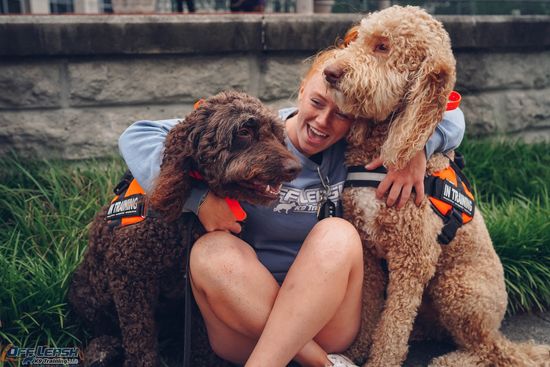Is a Board and Train Program Right for Your Dog's Training Demands?
Is a Board and Train Program Right for Your Dog's Training Demands?
Blog Article
Recognizing the Significance of Pet Training in Shaping Actions
Understanding the significance of pet training is necessary for cultivating favorable habits that boost the partnership between canines and their proprietors. The implications of training prolong past plain obedience; they touch upon the emotional well-being of the canine and the dynamics of human-animal interactions.
Benefits of Dog Training
One of the key advantages of pet training is the facility of a strong bond between the dog and its owner, which can dramatically enhance the pet-owner connection. Training fosters interaction, understanding, and depend on in between the 2, consequently producing a much more harmonious living atmosphere.
In addition, trained pets are more probable to display desirable behaviors, making them much easier to handle in various situations. This not only benefits the proprietor however also contributes to the pet's general wellness. A well-trained pet is often more confident and much less distressed, as it recognizes what is anticipated of it and really feels secure in its duty within the family.
In addition, pet dog training can enhance socialization abilities, permitting pet dogs to communicate positively with various other pet dogs and individuals. This social exposure lowers the likelihood of fear-based responses and hostility, advertising an extra peaceful existence in area settings.
Furthermore, constant training routines can promote a dog's mental professors, reducing dullness and harmful behaviors. In recap, the benefits of pet dog training prolong past simple obedience; they incorporate emotional enrichment, improved habits, and enhanced lifestyle for both the animal and its proprietor.
Usual Behavioral Concerns

Leaping on guests can create uneasy circumstances and might indicate an absence of impulse control or exhilaration. Hostility, whether in the direction of other pets or individuals, is maybe the most severe behavioral problem, usually rooted in concern, territoriality, or not enough socializing.
Other usual troubles consist of splitting up stress and anxiety, where dogs display distress actions when laid off, and leash pulling, which can prevent pleasurable strolls. These behavioral challenges not only impact the pet's well-being however also strain the owner-pet connection. Determining the root creates of these issues is critical for effective management. Recognizing these typical behavior issues gives a structure for dog owners to seek proper options, ultimately cultivating an extra harmonious living setting for both animals and their families.
Training Strategies and Techniques
Attending to typical behavioral issues in dogs typically requires efficient training strategies and techniques tailored to each dog's unique requirements. Positive reinforcement is among one of the most widely supported strategies, stressing the benefit of desirable actions instead of punishment for unfavorable ones. This method enhances the bond in between the canine and the trainer while cultivating a more loosened up learning atmosphere.
Remote control training is another effective approach that utilizes an audio signal to note the exact minute a desired actions takes place, followed by a benefit. This precise timing assists pet dogs understand what is anticipated of them, resulting in quicker understanding outcomes.
Leash training, essential for taking care of a dog's actions during walks, can be approached through techniques such as loose-leash walking, which advertises a controlled and tranquil experience for both the pet dog and handler.
Socialization training is essential for cultivating ideal interactions with other dogs and individuals. Direct exposure to varied settings, sounds, and experiences during the puppy phase can considerably decrease fear and aggressiveness later in life.
Utilizing a range of techniques ensures that training continues to be engaging and effective, ultimately resulting in mannerly pet dogs and harmonious partnerships with their proprietors.
The Function of Consistency
Consistency plays an essential function in reliable pet dog training, as it helps strengthen preferred habits and establish clear expectations. When training a dog, it is important that signs, commands, and incentives are used evenly by all relative and fitness instructors. This harmony stops confusion for the dog, making certain that it comprehends what is expected in numerous circumstances.
Inconsistent reactions can result in behavior issues, as pets might have a hard time to decipher what activities are acceptable or awarded. If a canine is compensated for sitting on one celebration but reprimanded for it the next, the pet might become anxious and dizzy, ultimately undermining the training procedure.
Using regular spoken commands, hand signals, and incentive systems reinforces the learning experience. Maintaining a routine training routine cultivates a setting conducive to learning, enabling the pet to anticipate when training will take place and remain psychologically engaged.
Inevitably, the dedication to consistency not only boosts the performance of training methods yet additionally cultivates a sense of protection and stability for the pet dog. This approach lays the groundwork for successful lasting therapy and an unified relationship between the canine and its owner.
Building a Solid Bond
A solid bond in between a dog and its owner is fundamental to successful training and total well-being. This partnership fosters trust fund and communication, important elements in reliable canine training. When pets check my reference trust their owners, they are more probable to respond favorably to hints and commands, leading to a much more harmonious communication.
Building this bond requires time, persistence, and constant positive support. Participating in tasks such as training, exercise, and play sessions not only enhances obedience yet additionally reinforces the psychological link. Pet dogs prosper on social communication; for that reason, investing quality time with each other can substantially enhance their habits and responsiveness.

Eventually, spending in constructing a solid bond with a dog lays the foundation for effective training, making sure that both the pet dog and the proprietor appreciate a meeting partnership characterized by shared respect and understanding.
Conclusion
To conclude, effective pet dog training plays a critical function in shaping desirable habits and cultivating a harmonious relationship between pets and their proprietors. By addressing common behavioral problems and utilizing techniques such as positive support and consistency, training not just enhances obedience yet additionally motivates socialization and psychological engagement. Ultimately, the facility of clear expectations and consistent interaction adds to a well-adjusted canine, advertising lasting trust fund and understanding within the human-animal bond.
Comprehending the value of canine training is necessary for promoting favorable actions that boost the connection between pets and their owners.Addressing typical behavior concerns in dogs typically calls this website for effective training methods and approaches customized to each pet dog's unique demands.Consistency plays a pivotal function in effective pet dog training, as it helps strengthen desired habits and develop clear assumptions.A strong bond in between a dog and its owner is fundamental to successful training and general health.In final thought, effective pet dog training plays a pivotal function in forming desirable behaviors and fostering a harmonious partnership between family great post to read pets and their owners.
Report this page